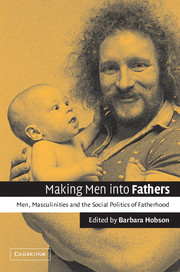Book contents
- Frontmatter
- Contents
- List of figures
- List of tables
- Preface
- Introduction: making men into fathers
- Part 1 Who fathers?
- 1 Coresidential paternal roles in industrialized countries: Sweden, Hungary and the United States
- Part 2 Men in social policy and the logics of cash and care
- Part 3 Resisting and reclaiming fatherhood
- Part 4 Theorizing men, masculinities and fatherhood
- Notes
- References
- Index
1 - Coresidential paternal roles in industrialized countries: Sweden, Hungary and the United States
Published online by Cambridge University Press: 22 September 2009
- Frontmatter
- Contents
- List of figures
- List of tables
- Preface
- Introduction: making men into fathers
- Part 1 Who fathers?
- 1 Coresidential paternal roles in industrialized countries: Sweden, Hungary and the United States
- Part 2 Men in social policy and the logics of cash and care
- Part 3 Resisting and reclaiming fatherhood
- Part 4 Theorizing men, masculinities and fatherhood
- Notes
- References
- Index
Summary
There have been dramatic changes in family patterns throughout the industrialized world during the last third of the twentieth century. Male–female relationships have become less committed, at least as indicated by the rapid rise in divorce and in cohabitation, which in most countries also involves less commitment than marriage. The couple relationship has become a much less central and stable element in adults' lives, both for men and for women.
These patterns are frequently noted. Less frequently noted, however, is a clear concomitant: that parenthood has become a much less central and stable element in men's lives, not only compared with the past, but particularly as compared with its role in the lives of women. In all of the countries undergoing these changes, the connections between men and children have become complex. Men are increasingly unlikely to live with their own biological children, struggling (some more and some much less successfully) to maintain rewarding and supportive relationships with them, yet increasingly likely to live with other children, the children of their current partner, with whom it is not clear at all what sorts of relationships should be established or maintained. In David Morgan's terms (see Morgan in this volume), the core meaning of “fatherhood” is challenged when men are confused about how to “father” either their absent biological children or the children (of their partner) with whom they do live. It is often not totally clear in either case whether they should be considered “fathers” at all.
- Type
- Chapter
- Information
- Making Men into FathersMen, Masculinities and the Social Politics of Fatherhood, pp. 25 - 58Publisher: Cambridge University PressPrint publication year: 2002
- 1
- Cited by



